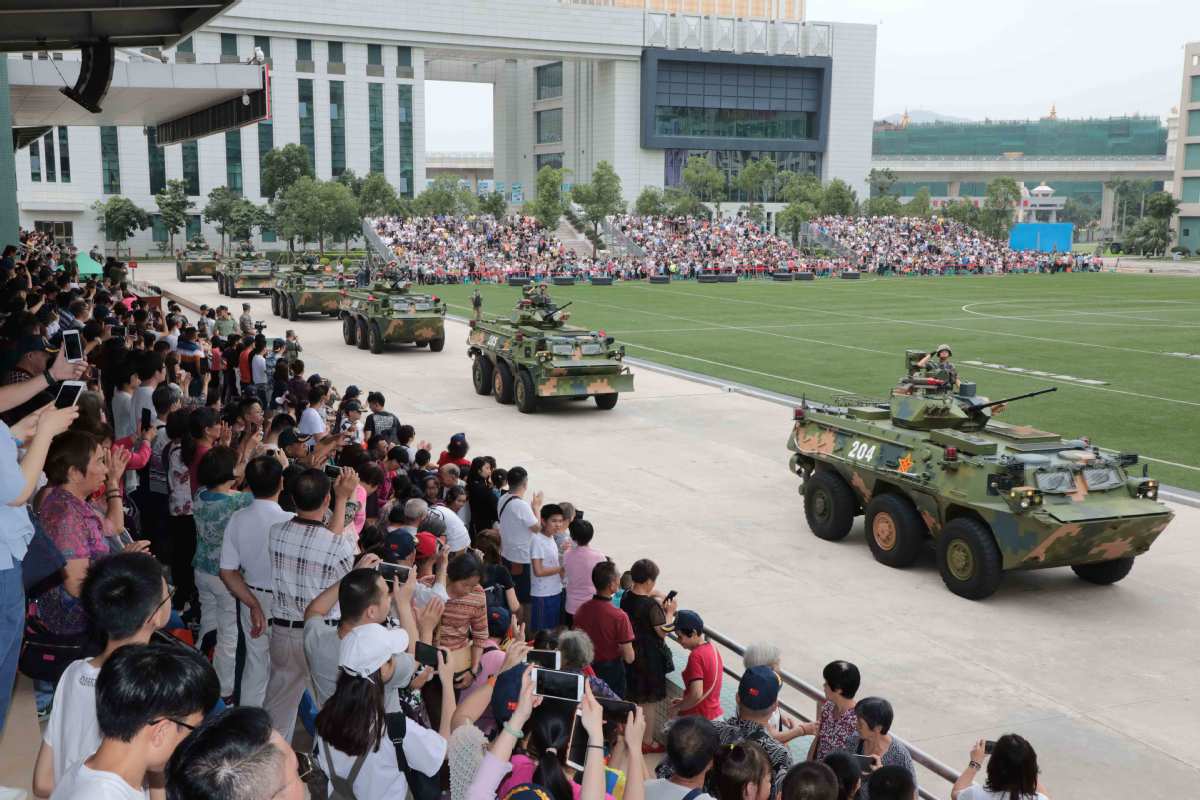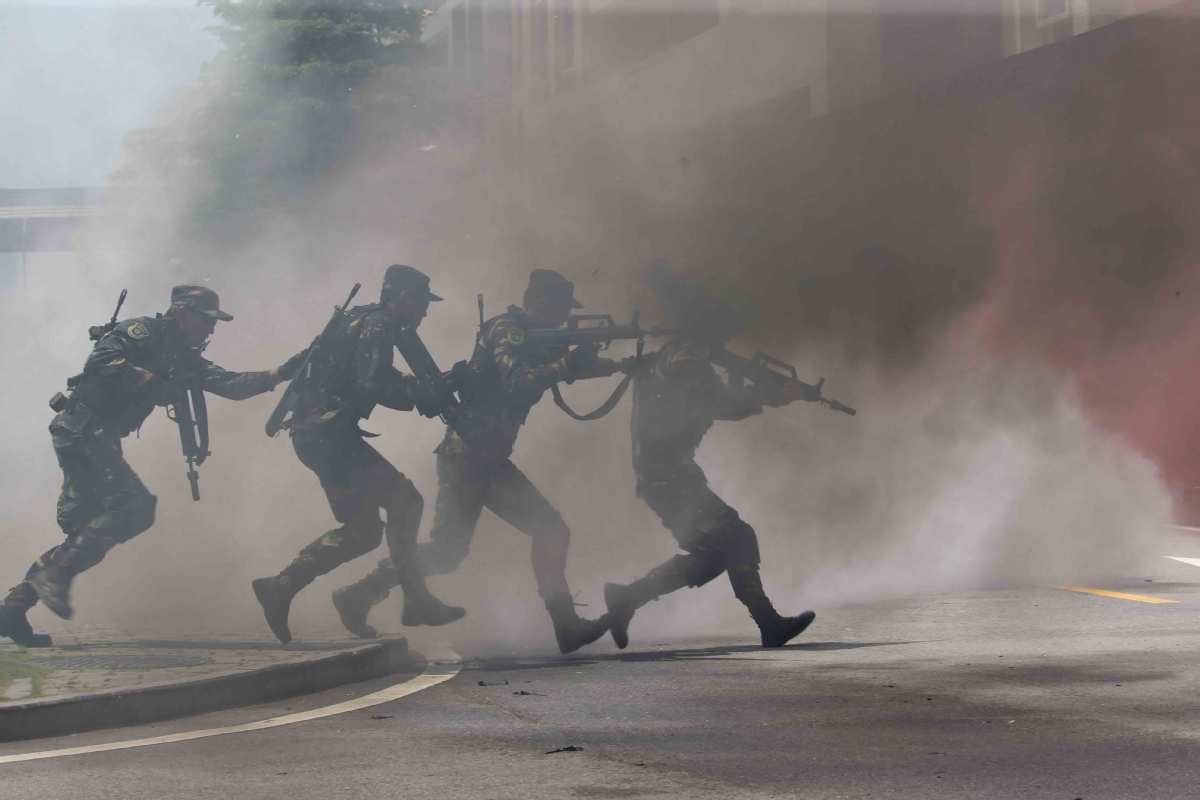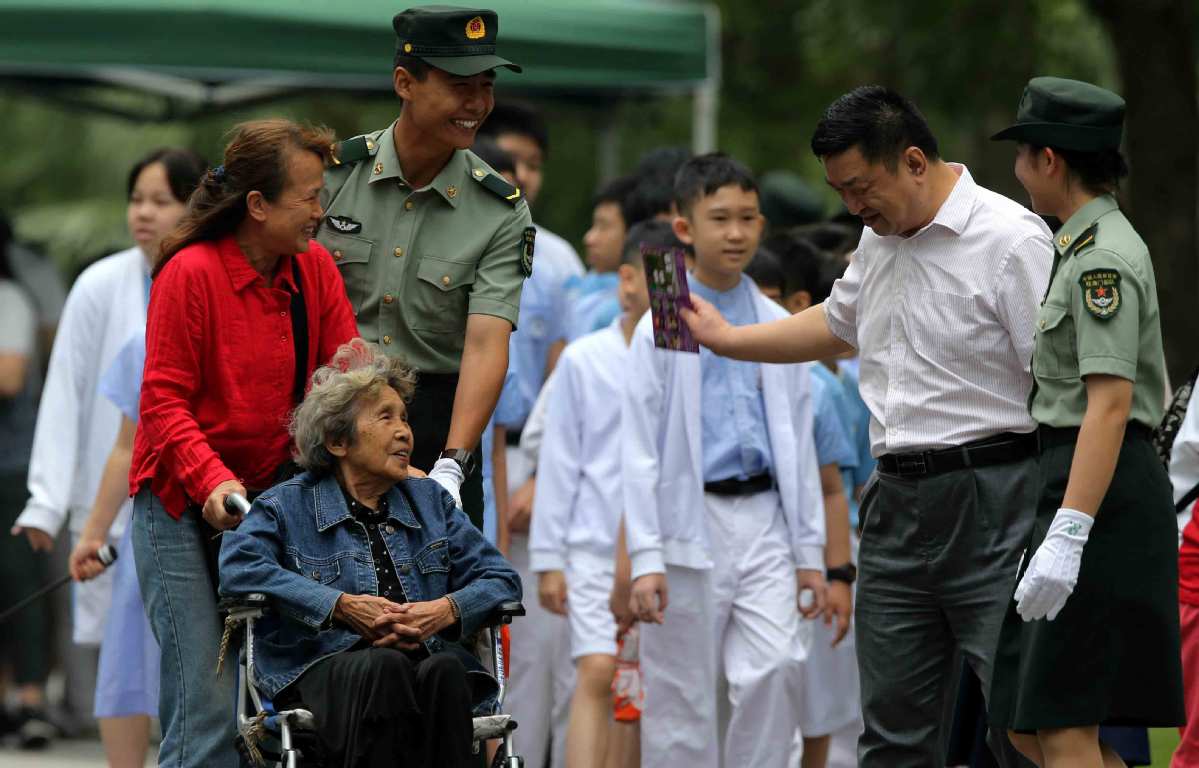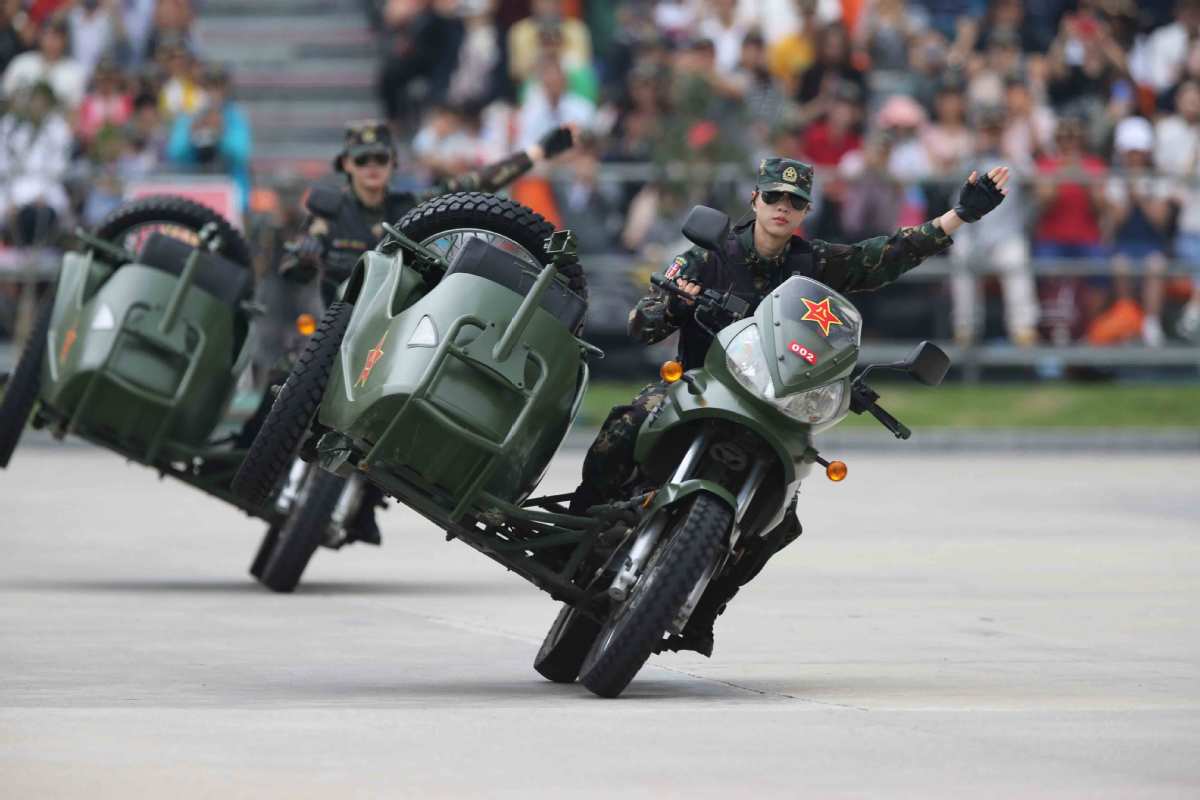
PLA soldiers salute as they pass spectators during an open house at the Macao garrison in May. YE HUAMIN/XINHUA
PLA soldiers are celebrating two decades of serving local people. Zhao Lei reports from Macao.
Song Haiqiang, an officer at the People's Liberation Army Macao Garrison, said he was truly moved during an open house held at his base on Taipa Island in May.
"The first part was the national flag-raising ceremony. Everyone-soldiers and civilians-was required to stand and sing the national anthem," said Song, commander of an armored infantry company at the garrison.
"I saw many Macao people burst into tears as the national flag was carried and escorted by six local children. Some people also shed tears when they sang the national anthem."
He attributed the tears to increased patriotism among Macao people, who, according to him, regard the garrison as a symbol of the motherland in the city.
"Each time we host a three-day open house at our base, thousands of Macao people form a very long line outside the main gate to get entry tickets," Song said. He explained that everyone with a Macao ID card is eligible for one free ticket, and the number for each day is limited because of the base's small area and restricted visitor capacity.
"Many people are eager for the opportunity to see our base and find out what the soldiers do at the barracks, so the tickets always run out before everyone in the line gets one," he said.
"It is not uncommon to find some people are unwilling to leave, saying they don't mind paying for a ticket. Some stand outside the walls of the base, trying to see what's going on inside."
Song said the garrison prepared 2,000 handheld national flags for Macao residents attending the open house in May, but found that the flags were so popular it did not even have enough for the first day. The garrison had to place orders for 2,500 extra flags for the second and third days.
In March 1999, the PLA Macao Garrison was set up in Zhuhai, a coastal city in Guangdong province that neighbors Macao. The soldiers entered Macao on December 20, 1999-the day China resumed its exercise of sovereignty over the "Monte Carlo of the Orient" after more than 400 years of colonial rule by Portugal.
The garrison held its first open house in Zhuhai in November 1999, and to date has organized 16 such events, receiving more than 100,000 visitors. The open day usually takes place at the Taipa Island base in May every year.
Zhang Yan, a staff sergeant at the garrison who has taken part in the open house for many years, said he has noticed that the number of Macao residents singing the national anthem-March of the Volunteers-during the events has risen every year. When last year's open house began, he was surprised to see almost all the local people present singing the anthem.
"I was really amazed that everyone, including small children, who I guessed were no older than 5, were singing the anthem. The children near my duty position couldn't stay in tune for the whole anthem, but they seemed to be trying their best to do so. I was touched and could feel the tears in my eyes."

Soldiers from the PLA Macao Garrison carry out an antiterrorism exercise in 2017. YE HUAMIN/XINHUA
Summer camps
In addition to the open house, the Macao Garrison holds regular summer camps and flag-bearer training sessions.
According to garrison statistics, the base has hosted 15 summer camps for students from local middle schools and three for university students.
Officers and soldiers have helped Macau University of Science and Technology, the University of Macau and four other universities establish national flag-bearer teams, and have also trained more than 3,000 flag bearers for about 60 local schools.
This year's flag-bearer training session had more than 260 participants from 30 middle schools in Macao, the garrison said in a statement.
Zhang Zhixing, political instructor of Song's company, said the students are enthusiastic and attentive in flag-bearer training because they consider it an honor to carry and raise the national flag.
Song said, "The garrison wants to use the summer camps and training sessions to help students learn about the PLA and also to strengthen their familiarity with the military."
The students wear PLA uniforms and stay at military bases for about 10 days. They learn how to act like soldiers and are given the chance to fire live rounds from assault rifles, according to Song.
"We also take them to visit big businesses and museums in Zhuhai to help them gain more knowledge about the (Chinese) mainland," he added.
He said that before the students are sent back to their schools, the garrison usually makes a survey of their thoughts and feelings. "Most said the experience let them know about the real lives of our soldiers and their contribution to the city," he said.
Soldier Zhang Yan, a native of the eastern province of Shandong, regards Macao as his second hometown.
"I've spent eight years in Macao. Many elderly people here don't speak Mandarin, and some don't even understand it," he said. "However I can always tell that they feel friendly toward us by the expression on their faces or in their eyes."
In his first years of service in Macao, it was common to find a few stores where the staff members could not speak Mandarin.
"It is now very difficult for me to find a local store without any Mandarin-speaking employees. Now, some salespeople speak better Mandarin than I do," he said. "I feel very fortunate to witness mainland-Macao ties becoming closer every day."

Macao people attend an open house at the garrison base in May. YE HUAMIN/XINHUA
Safeguards and support
At a recent meeting with mainland reporters, Fernando Chui Sai-on, who will leave his post as chief executive of the Macao Special Administrative Region on Friday, said he wanted to express gratitude on behalf of all Macao people to the PLA garrison for its service and contribution to the city.
"They are the major force that safeguards our security. They have given a great deal of support to us and always abide by garrison law," he said. "Macao people love the soldiers because they have done a lot for us. There are many people who visit the troops' base during the garrison's open house every year, as the locals have a deep affection for the soldiers."
He cited the garrison's assistance in the wake of Typhoon Hato as an example of the central government's strong support for the city. The storm, which hit Macao in August 2017, was the most devastating disaster in the area since 1953, when the city's typhoon records began.
"It was a very difficult period for our city, because we hadn't met such a strong typhoon in recent decades," he recalled.
"At that time, the garrison's troops offered us a great deal of support. They worked hard with the locals to reduce losses and alleviate the impact to help us return to a normal life."
Wong Kin, an adviser to the Macao Unitary Police Service, stressed that PLA soldiers played an important role in the relief work after Typhoon Hato.
"We discovered that we were facing a serious situation-there was garbage everywhere and sanitary conditions were deteriorating. We needed a lot of hands to clear the garbage and debris," he said. "At the same time, there was another typhoon approaching, and we were worried about its consequences."
Given the difficult circumstances, the city government decided to invoke terms in garrison law to ask for the central government's permission to deploy soldiers in the relief efforts, Wong said.
"Soldiers from the garrison were quickly dispatched to help us clean the streets. As far as I saw, the residents very much welcomed the military's assistance, and were very grateful. Some residents said the soldiers came to their house to take out heavy items, and helped restore many roads. Their help also enabled us to be better prepared for the next typhoon," he added.
Guan Liuhan, a female soldier at the garrison, recalled that many of her peers were sent onto the streets together with their male comrades to help clean up the mess.
"The typhoon was so powerful that the roof of our residential building was blown off. To be honest, we girls were frightened, but none of us quit when we were summoned by the commanding officer, who told us to make ready for relief tasks outside our base," she said.
"After we got to the site where we were ordered to assist residents, I literally saw a 'mountain of garbage' on the street and nearly all the small buildings along the street had been destroyed."
Guan said she and her comrades used every minute to clear the waste and debris on the street, including large amounts of decaying, fetid fish and shrimps.
"When we returned to our base, I found my clothes smelled very bad. So I asked my sergeant if I could take them off," Guan recalled. "She replied, 'This is exactly the time a soldier should be prepared for orders to be mobilized'. It was then that I realized what it means to be a PLA soldier."
According to garrison statistics, the troops worked for three consecutive days in alternate shifts, helping to clear 120.5 kilometers of road and remove more than 700 truckloads of garbage and debris.
Local people used many methods to express the gratitude they felt to the soldiers.
About 150,000 residents, roughly 25 percent of Macao's population, wrote their names, words of gratitude and blessings on 17 scrolls, which were handed to the garrison's commander by representatives from all walks of life.
"The PLA soldiers are like our family members, and they truly care about us," said Lau Sin Peng, a distinguished educator in Macao, quoted by China Radio International.
"We were extremely happy when we saw them come out to help us after Hato, and they really did many good things for us. In the past, it was only in movies and books that we heard the saying that the PLA members are the people's soldiers. After the typhoon, our personal experiences told us that it is true."
In a handwritten letter sent to President Xi Jinping in June, students at the Premier School Affiliated to Hou Kong Middle School in Macao said the sight of PLA soldiers using all their strength to help people affected by the typhoon taught them the real meaning of the word "motherland".
Meanwhile, Xinhua News Agency cited the result of a recent poll in Macao showing that the PLA Macao Garrison has maintained a 99 percent approval rate from local people for several years.

Female soldiers perform stunts in front of civilians. YE HUAMIN/XINHUA
Diligence and duty
Reviewing the 20 years of its existence in Macao, the PLA garrison said its troops have honored their mission and diligently fulfilled their duties.
"Along with the successful implementation of the principle of 'one country, two systems', the garrison is one of the foundations of stability and prosperity in Macao, supporting the continuation of 'one country, two systems'. Our soldiers have proved that they deserve the trust given by the motherland and the people," the garrison said in a statement.
"During the past two decades, we have witnessed our troops and the Macao people move together toward the same goal of realizing the great national rejuvenation, and, at the same time, develop a deep-rooted, harmonious bond," the statement added.
Edmund Ho Hau-wah, a vice-chairman of the National Committee of the Chinese People's Political Consultative Conference and the first chief executive of the Macao SAR, said the PLA Macao Garrison is a pillar to safeguard the principle of 'one country, two systems', and it guarantees Macao's prosperity and stability.
"We feel privileged and proud that we have these brave and lovely soldiers as our guardians," he said.
Fang Zhao in Macao and Zhang Yi in Beijing contributed to this story.









